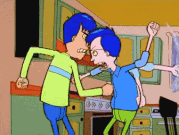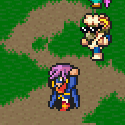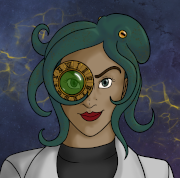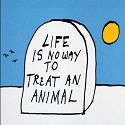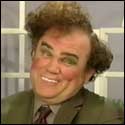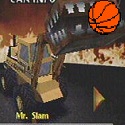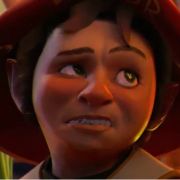|
magnificent7 posted:People give me advice or critique. I choose to ignore parts of them, and cherrypick only those I like. Here is me telling all of you that I choose to do that. This is almost every other post you make in this thread. Please expand your horizons and have more variety in your Something Awful forum thread post-writing. The Saddest Rhino fucked around with this message at 17:35 on Apr 24, 2014 |
|
|
|

|
| # ? May 14, 2024 02:57 |
|
I'm glad a bunch of (mostly) unknown aspiring writers have agreed for the 1400th time that some crits are useful and good and some aren't. Really glad. Currently thanking whatever deity compelled me to bookmark this thread. Can we bitch about how hard it is to write a novel with like themes and poo poo instead? I'm still first draftin' through my first book, and right now all I can do is pump out rough, utilitarian action/dialog/description. I'm really big on books with ~meaning~ beyond just "here is what happened to some people, the end". I'm assuming that this is a second draft problem, but I'm curious what other people's approaches are, since asking about it here is way easier than writing the drat book and finding out for myself 
|
|
|
|
For better or worse, I just started with the text. The story I wanted to tell. And the more I dwelled on it, the more parallels I drew between the story and the "big things" that were on my mind that may have driven me to tell this story in the first place. That's how I learned that this private eye novel was really a story about nostalgia -- and in turn, perception. Knowing that has informed my characters and their development, as well as the solution to the mystery I created (though I'm still cornered on how my protagonists figure out the culprit). Of course, the big flaw in this plan is that all this time spent dwelling was not spent writing, which isn't necessarily smart when you're on your first pass. So assuming I answered your question, take my words with a grain of cliché.
|
|
|
|
I find themes are largely an organic thing too, and subject to a great deal of change in the process of writing, mostly because characters are unpredictable and complex. The thing I'm working on at the moment started with the characters and their conflicts, which suggested a number of themes - the morality of murder, predator-prey relationships, what it means for a person to be monstrous, blah blah blah. But now sitting near the 75% mark of the first draft the whole thing isn't about those at all and is probably about identity. I didn't plan that, but looking back it's really clear that's what was going to happen with the protagonist. It probably helps that I really like stories in which themes are not spelt out in big red letters but instead simply implied by the characters' conflicts and desires and worries and failures. I wouldn't worry about it too much, just let it happens and see what you get.
|
|
|
|
Sitting Here posted:I'm glad a bunch of (mostly) unknown aspiring writers have agreed for the 1400th time that some crits are useful and good and some aren't. Really glad. Currently thanking whatever deity compelled me to bookmark this thread. I've heard a lot of novelists will just write their story then use their edits to put a theme or message or whatever in through rewrites, and I think that's a good idea, but as I'm picking up on the occasional thing here and there (Manny's been intimidated by someone! Maybe I can start writing his chapters as having the theme of intimidation!) I'll just make a note in Scrivener in a folder called Themes, and I'll just make a quick note about how I can use that again in the future. I also tend to start each chapter with a theme/concept/whatever and write to that, and if I can, I like to contrast the underlying idea behind a chapter with the one just before it. So, say I write a chapter where a character goes and meets a priest who gives her some advice, I'll try and make the next chapter either have another character meet a criminal who gives advice or I'll make the same character try and follow said advice only to have it blow up in her face. If I can wrangle it, I'll make it happen involving religion too. That's a kind of lovely example, but it works. If I'm too ham-handed, I'll take that poo poo out in a rewrite, or space the scenes further apart, or just subtle it out some. Basically that was a whole bunch of words to say "I let themes show themselves then try and repeat them."
|
|
|
|
Steven King's 'On Writing' has good advice about themes. He essentially says that nothing good comes of fiction when you start with a theme and try to build a story around it. For King the only exceptions are satires like Animal Farm. Although there are exceptions to this rule I'm inclined to agree with him. The story must come first. Themes seem to develop (or are already present) subconsciously. In your rewrites you can bring these themes out more but they should already be there.
|
|
|
|
The Saddest Rhino posted:This is almost every other post you make in this thread. Please expand your horizons and have more variety in your Something Awful forum thread post-writing. Sitting Here posted:I'm glad a bunch of (mostly) unknown aspiring writers have agreed for the 1400th time that some crits are useful and good and some aren't. Really glad. Currently thanking whatever deity compelled me to bookmark this thread. OH drat you grumpy tarts caught me again!
|
|
|
|
I tend to have themes thought up by the time I'm writing, but that's because I spend a lot of time in the planning stages and comparatively little time writing. (I have to work on spending more time with actual words and less with imagining what words I could use, incidentally.) It's true though that when I get a theme, it comes from what I'm writing about first. For instance I'll want to write a story about a catastrophic flood and as I'm planning it out I realize that I want the theme to be about letting go of the past, so I write with that in mind. I seriously need to get more used to editing, but I procrastinate and when I do edit, all I tend to change is sentence-level grammar and I don't work on overall structure or stuff like that.
|
|
|
|
Hey all, I'm writing short stories for practice and I'm having some trouble finding an efficient method to keep track of things in my fictional universe (eg. locations, characters, fictional technologies, etc.). Currently using Evernote but I'm not too comfortable with it yet and I just have one notebook for all my writing right now. I've heard of people using wikis to manage their ideas or using colour coded tabs in physical journals. Any recommendations for managing all these thoughts?
|
|
|
|
Depends on the OS, but if you're running Windows, give yWriter a shot.
|
|
|
|
I use a sophisticated combination of scrivener and a mess of unindexed notes in spiral notebooks, which jump between stories with no warning. Don't recommend the second part of that so much, but eh. I don't have much I need to keep track of yet, I guess? I use Evernote for other stuff and like it a lot. If I were to use it for fiction notes, I'd try one of the following: a notebook stack for each project, with a notebook in it for characters, one for setting, one for technology, etc. Then one note for each character, etc. plus some extra notes about how stuff overlaps and do I put this inventor who never appears in the story, but is relevant because he invented X under characters or technology? Does terraforming go under setting or technology? Oh god kill me. Or, I would have one notebook stack for fiction, with a notebook for each project, and use tags like "setting" and "character" to categorize notes. But actually I would always forget to tag my notes, because that's just what I do. Luckily Evernote has a good search function, so probably not a big deal.
|
|
|
|
Thanks for the replies. I prefer to keep my work on my mac and save the pc for games and media. Any apps for mac like yWriter? I'll give the Evernote suggestion a go as well. I've been trying to figure out how to implement a better workflow for organizing my notes.
|
|
|
|
Scrivener works really well for me and Mac is the lead platform.
|
|
|
|
That would be scrivener, probably, though it's not free. It goes on sale for half-price every now and then, that's when I grabbed it. Edit: I mostly use Scrivener now, the handwritten notes are just because I think better that way sometimes. Scrivener has a lot of great functions, like being able to split the screen between notes and manuscript, compiling into various formats (both file formats and visual formats, like "standard manuscript format"), tagging, outline and notecard views, and session word count tracking. Plus lots more that I haven't used yet. Dr. Kloctopussy fucked around with this message at 03:14 on Apr 26, 2014 |
|
|
|
Yeah, it's all about the Scrivener when you're doing massive editing work like that. It just breaks everything down into pretty much anything you could conceivably want to keep track of everything. It can be a little daunting at first, since it's really weird to try and keep the "paper" mindset of bookmarks, colored tags, and all that jazz when working on a computer screen, but it really does work. The best part is being able to export into pretty much any format, so I used it to get my first draft loaded as a Kindle book that I can read through and work on during my lunch breaks at the day job. I have a Kindle Fire HD, and even though the Notes system isn't nearly as fleshed out as Scrivener, it does what I need it to to keep things colored, tabbed, and noted for when I can get back in front of the main copy at home. Just having something to write on so you don't forget things helps a ton, and reading it on an e-reader or any other medium that's "Not PC Monitor" has really helped change the perspective a lot. It also helps you realize your work can actually look like a real book, which is highly motivating. Axel Serenity fucked around with this message at 07:54 on Apr 26, 2014 |
|
|
|
Speaking of making your work look like a real book, fonts can go a long way toward helping that, even just on the computer screen. If you're using Google Docs to write, it hooks into Google Fonts, so you have a huge selection of open source fonts to choose from. If you don't quite know which one to go with, I'd suggest the open-source version of the classic Garamond. When I went through my stories and switched them from Arial to Garamond it was like going from looking at some bullshit a goon wrote to looking at something that could be, like, a book.
|
|
|
|
Holy poo poo, that's a really good idea. I just had Calibri as my default font set across everything, but switching to Garamond just seems, I dunno, nicer. I think I'm going to switch my font every time I hit a bit of writer's block from now on; what a simple way to make this thing seem new.
|
|
|
|
Manuscript format with Courier New or Times New Roman because the only way to finish a novel is with the cold, hard fist of progress.
|
|
|
|
This week was my third entree into Thunderdome and writing it I understood the value of focusing on the central conflict when building out a story. I don't think I necessarily communicated what the conflict was over as clearly as I should have, and the characters were not totally crystallized, but I think there was clear conflict. By putting the story in a community that was both matriarchal and blind, I think I overloaded the setting -- I also got stuck in my usual hole of writing at a distance, which I am trying to break out of. But I understood writing out from a central conflict! Hopefully my contagion is identifiable. I think approaching a story from the mindset of what is the conflict, instead of what is the plot, will help me break of of my fairly conventional brainstorming. I've been reading a collection of Isaac Asimov stories and trying to think about what the conflict is in each one. In Day of the Hunters is the conflict simply the professor trying to convince the technicians he saw what wiped out the dinosaurs? Is it also an internal conflict of reluctance to tell them? Stories like Does a Bee Care? are clearer, but then in something like Silly Asses, a story where the Galactic keeper of records strikes Earth from a list of planets to join a federation because we haven't entered outer space, and test atomic weapons on our own service, is less clear. Its more like the creative presentation of an idea -- maybe I am thinking too strictly about what a short story is? I wanted to ask the thread that if they think a short story must contain some kind of conflict, to what extent does it need to be the focal point to produce something satisfying for the reader? That's probably a length of string type question, but that's what I've been thinking about as I read stories from the perspective of a writer. Once I understand conflict, its on to not writing at an arms length, and figuring out how to have non wooden characters! 
|
|
|
|
My preferred formulation is 'what does #character want, why can't they get it, why do we care?' The galactic overlords story makes more sense through that lens. Vv yep sebmojo fucked around with this message at 10:02 on Apr 28, 2014 |
|
|
|
sebmojo posted:My preferred formulation is 'what does #character want, why can't they get it, why do we care?' The galactic overlords story makes more sense through that lens. Does the 'why do we care?' refer just to the stakes of #character getting what they want? We care if Luke Skywalker stops his space shogun dad, because if he doesn't all these bear children are going to die? Or is it broader? Actually applying your points to the Asimov story kind of answers that. The galactic keeper wants to add Earth to a list of civilizations which have matured. He can't do it because we haven't ventured into space and we test atomic weapons on our own surface. We care because it makes us think how an outsider might view our civilization negatively. I don't really care if the galactic record keeper is dissatisfied, I care because of the real world implication of his dissatisfaction. Thanks for that - I'll try and mark my brainstorming against those elements on the next Thunderdome.
|
|
|
|
Hocus Pocus posted:I think approaching a story from the mindset of what is the conflict, instead of what is the plot, will help me break of of my fairly conventional brainstorming. I've been reading a collection of Isaac Asimov stories and trying to think about what the conflict is in each one. In Day of the Hunters is the conflict simply the professor trying to convince the technicians he saw what wiped out the dinosaurs? Is it also an internal conflict of reluctance to tell them? Stories like Does a Bee Care? are clearer, but then in something like Silly Asses, a story where the Galactic keeper of records strikes Earth from a list of planets to join a federation because we haven't entered outer space, and test atomic weapons on our own service, is less clear. Its more like the creative presentation of an idea -- maybe I am thinking too strictly about what a short story is? I think some of Asimov's short stories just don't have a conventional conflict. They function much more like jokes, where all you're really given is a setup/hook which is compelling enough to get you to read to the end and find the resolution/punchline. Of course, many of them literally are just jokes.
|
|
|
|
Are there any good resources out there improving characterization? Even some recommended reading (preferably short fiction) would be awesome. I've realized that my biggest writing weakness is having characters grow out of a plot idea rather than the other way around, and I need to learn how to write believable characters that don't just observe the story going on around them.
Grizzled Patriarch fucked around with this message at 03:33 on Apr 30, 2014 |
|
|
|
I feel that the Elements of Fiction Writing series is a great resource in general. I've listed the Characterization volume below. The books do a nice job of really breaking down the craft of fiction and explaining how to make your writing not boring and unoriginal. Elements of Fiction Writing: Characters Conflict & Suspense Plot Scene & Structure Beginnings, Middles, & Ends Description (This is the only one that I have not read yet). The Sean fucked around with this message at 04:03 on Apr 30, 2014 |
|
|
|
I have three POV characters but only a real conflict planned for two of them. The first two conflicts spring out of actions performed by the antagonist and measure what they'll do when faced with allowing innocents to be hurt for the (seeming) greater good. But this third character, he's just there to observe the world around him. He has no unique insight other than an outsider's perspective and he doesn't move the plot forward. It's hard to write him out at this point but unless I pull a rabbit out of the hat and cram some conflict in there he's just going to be a little sidequest in the grand scheme of things. And this is all very sad since he was supposed to be the main character.
|
|
|
|
MrSlam posted:I have three POV characters but only a real conflict planned for two of them. The first two conflicts spring out of actions performed by the antagonist and measure what they'll do when faced with allowing innocents to be hurt for the (seeming) greater good. I had the exact same problem with a novel of mine. I tried to add more conflict to the central character, flesh her out more, but all I ended up with was bloat that dragged the story down. It took me a long time before I was ready to let go of all the reasons "she was supposed to be there" and cut her POV for the sake of telling a better story. When you have one or two characters doing interesting poo poo, and another character left with nothing much to do, it pretty much indicates that the part is extraneous. Engineering extra conflict just to keep them in the game is often not worth the effort. If I'd listened to my gut earlier when it kept telling me this character just wasn't working, I'd have a whole lot less rewriting to do. I suggest you grab a copy of The Tragedy of Pudd'nHead Wilson by Mark Twain (from Project Gutenberg or wherever) and read his essay at the end about how much of his original idea he had to sacrifice to make the story work. It's enlightening. Edit: I think the essay is called "Those Extraordinary Twins" if I remember correctly. Stuporstar fucked around with this message at 05:00 on May 2, 2014 |
|
|
|
Speaking of POV characters, I'm working on a novel right now (used to be a short story) and I decided to really flesh out the protag's girlfriend to the point where she's the other main character. My plan is to alternate chapters between them, but not to the GRRM extent of naming each chapter either "Bronco" or "Holly." I'm thinking that some of their chapters will overlap to show different sides of the same scene, with some anamolies in dialogue lines and event details to indicate somewhat unreliable narrators. Anyone think that sounds dumb or cool or anything else? Obviously it's all execution but just wondering what people think about the concept.
|
|
|
|
Martello posted:Speaking of POV characters, I'm working on a novel right now (used to be a short story) and I decided to really flesh out the protag's girlfriend to the point where she's the other main character. My plan is to alternate chapters between them, but not to the GRRM extent of naming each chapter either "Bronco" or "Holly." I'm thinking that some of their chapters will overlap to show different sides of the same scene, with some anamolies in dialogue lines and event details to indicate somewhat unreliable narrators. Anyone think that sounds dumb or cool or anything else? Obviously it's all execution but just wondering what people think about the concept. The concept definitely works if done properly. See The Rules of Attraction by Bret Easton Ellis--I'm pretty sure he does exactly what you've described at least a few times in that book and it's brilliant.
|
|
|
|
How do people feel about POV shifts from 3rd person to 1st person in a story? For example, a character uncovering clues by interviewing people. Also, I have a character whose entire POV is insane rants in a more-or-less epistolary style. Can all this stuff work? I'd love examples of novels where it does, because my first draft looks like an incoherent mess to me.
|
|
|
|
Stuporstar posted:How do people feel about POV shifts from 3rd person to 1st person in a story? For example, a character uncovering clues by interviewing people. Harlan Coben did something like this for Tell No One, where he'd stay in the protagonist's perspective for a few chapters, but then pull out for a few chapters to show the broader scope of the conflict he had stumbled into. I recommended the book earlier in the thread; it remains a solid beach read if you're up for a straightforward thriller/mystery.
|
|
|
|
Stuporstar posted:I'd love examples of novels where it does, because my first draft looks like an incoherent mess to me. Infinite Jest, Broom of the System. Underworld.
|
|
|
|
Martello posted:Speaking of POV characters, I'm working on a novel right now (used to be a short story) and I decided to really flesh out the protag's girlfriend to the point where she's the other main character. My plan is to alternate chapters between them, but not to the GRRM extent of naming each chapter either "Bronco" or "Holly." I'm thinking that some of their chapters will overlap to show different sides of the same scene, with some anamolies in dialogue lines and event details to indicate somewhat unreliable narrators. Anyone think that sounds dumb or cool or anything else? Obviously it's all execution but just wondering what people think about the concept. *** (or some more appropriate graphic) and readers should pick it up soon enough.
|
|
|
|
Re: Multiple perspectives In a story I'm working on, I already had plans for two viewpoint characters, who would start traveling together pretty early on (plus a third mysterious viewpoint character who gets very little time compared to the others, but is required to setup the end). Chapters would alternate between their perspectives. Later in the story, I wanted a couple more characters to join the group. I hadn't planned for those additional characters to become viewpoint characters, but the issue is that if I don't, then quite a bit of the story will really only focus on the two main characters, and the others will basically be dead to the story for quite a while. The obvious thing seems to be to leave it like that, because until they cross paths with the main character, I hadn't really given them anything to do. Those additional characters will be important, and I'm worried that focusing exclusively on the two traveling together will make the story seem too narrow. Re: Switching POV between first and third-person Originally, following the advice to "start the story as close to the end as possible", I wrote it to start in the timeframe where the bulk of it takes place. But there were key parts that happened 10 years earlier, and at one point, I considered switching from third-person to first person as one of my characters related what happened to the other in the form of a flashback. I did ditch that idea because that just made it clear "as close to the end as possible" was definitely "10 years ago", so I lost the flashbacks and the perspective switch to just tell it in chronological order. Martello posted:Speaking of POV characters, I'm working on a novel right now (used to be a short story) and I decided to really flesh out the protag's girlfriend to the point where she's the other main character. My plan is to alternate chapters between them, but not to the GRRM extent of naming each chapter either "Bronco" or "Holly." I'm thinking that some of their chapters will overlap to show different sides of the same scene, with some anamolies in dialogue lines and event details to indicate somewhat unreliable narrators. Anyone think that sounds dumb or cool or anything else? Obviously it's all execution but just wondering what people think about the concept. I didn't notice the key part. Unreliable narrators are always a tricky thing to do, especially in print. I remember reading a book "The Murder Exchange", by Simon Kernick. It also had multiple viewpoints, all told in first-person. One of them, Iversson had an incident in his backstory, where a woman went missing or was murdered, and all through the book, whenever it came up, he repeated that he didn't do anything to her. Keep in mind that this was first-person, we were inside his head. At the end, he's charged with the murder and it was revealed that in fact he HAD murdered her, and only then does he admit in first-person that he did it. I felt a bit cheated by the author, because we had been inside his head and seeing his reactions and thought process, and he'd been lying to not just the people in the world, but the reader as well. When it comes to unreliable narrators, you have to be careful, especially in print. It's easier in film, television, and games, where you can show the scenes and edit them to give one impression, when they actually are telling something else. Having two viewpoints and one unreliable narrator is effectively no different than having two unreliable narrators. It could very easily confuse the reader and unsettle them. Instead of getting immersed in the story, they could end up doing calculations in their head and wondering what really happened. The might end up getting distracted from the story and lost in the minutae. It could be that they'll just decide that the first version they saw is the truth and the other person is wrong. Stabbey_the_Clown fucked around with this message at 14:37 on May 4, 2014 |
|
|
|
SurreptitiousMuffin posted:Depends on the execution, but I'd have some sort of formatting quirk that makes the switches more obvious the reader. If their voices are strong/different enough then all you need is a I'm gonna switch POVs between chapters, not inside them, so no need for the *** or whatever. However I do plan on making their voices distinctly different. It's 3rd-person, not 1st, so it will be a little more tricky, but the narrative will take note of different things and use different terminology and so on. Bronco is a jaded, alcoholic street mercenary in his early 30s, and his girlfriend Holly is a 22 year-old college dropout with a baby girl and aspirations to eventually go back to school for her interior design degree. So they will notice very different things about the world around them and the people they interact with. Stabbey_the_Clown posted:Having two viewpoints and one unreliable narrator is effectively no different than having two unreliable narrators. It could very easily confuse the reader and unsettle them. Instead of getting immersed in the story, they could end up doing calculations in their head and wondering what really happened. The might end up getting distracted from the story and lost in the minutae. It could be that they'll just decide that the first version they saw is the truth and the other person is wrong. I'm not talking hugely different versions of events, just little details here and there, and especially differences in dialogue. So Bronco would remember that he said something a certain way, and Holly would remember it differently. I'm trying to play with the he-said, she-said type stuff when the chapters overlap.
|
|
|
|
What comes first? Finding an editor, or finding an agent? (assuming you plan to submit your MS to publishers).
|
|
|
|
magnificent7 posted:What comes first? Finding an editor, or finding an agent? (assuming you plan to submit your MS to publishers). Agent. I just pulled off the the manuscript -> agent -> three book deal with Tor
|
|
|
|
General Battuta posted:Agent. I just pulled off the the manuscript -> agent -> three book deal with Tor magnificent7 fucked around with this message at 20:06 on May 5, 2014 |
|
|
|
sethjosephdickinson at gmail
|
|
|
|
Kind of an odd question, but is there a general "best" range in word count for trying to get short stories published? Like obviously if you are George Saunders or Alice Munro something you can get away with writing basically novellas, but for the average person with no credentials, I'm curious how long a story should typically be. I've heard that under 1k words is just considered flash fiction and isn't particularly marketable, and I've also seen advice from published writers claiming that 2-3k words is the sweet spot for most publications.
|
|
|
|

|
| # ? May 14, 2024 02:57 |
|
General Battuta posted:Agent. I just pulled off the the manuscript -> agent -> three book deal with Tor Oh wow, three book deal with Tor!!! That really is the dream. Congratulations. How much of book 2 do you have written? Did they make the deal based on book 1 alone or ask to see part of 2? Did you write the manuscript in this year, too?? (And if so, do you also have a day job and/or life?) can you afford to quit your day job now?
|
|
|







